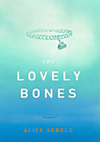
Comment
on this story
|
 |

The Lovely Bones portrays a peacefully dull heaven
by Jeanne McDonald
In Susie Salmon's afterlife, there are no pearly gates, no streets of gold, no marble halls. "When I first entered heaven, " Susie recounts, "I thought everyone saw what I saw.... That there were soccer goalposts in the distance and lumbering women throwing shot put and javelin. That all the buildings were like suburban northeast high schools built in the 1960s. Large, squat buildings spread out on dismally landscaped sandy lots, with overhangs and open spaces to make them feel modern." But after a few days, she realizes that the javelin-throwers and the shot-putters and the boys who play basketball on the cracked blacktop are all in their own version of heaven, just as she is.
Just as pedestrian as the landscape of Susie's heaven are the inhabitants. St. Peter is nowhere to be found; and when Susie flies up, Jesus is conspicuously absent as well. Her "intake counselor" is a 40-something woman named Franny, a former social worker for homeless people who serves lime Kool-Aid to restless newcomers.
Although one reviewer has called The Lovely Bones (Little, Brown, $21.95) "painfully funny," this novel depressed me to no end. Not that it isn't beautifully written, but because author Alice Sebold's idea of heaven is a somewhat scabby halfway community where the dead look down on their grieving families and feel sadness, on their former boyfriends and feel lust, on their murderers and long for vengeance. Perhaps Sebold is describing purgatory, for as Franny later informs Susie, she can move on to another, better place when she is ready to give up earth.
Yet there's something smarmy and uncompromising about it all, even though the traditional religious description of heaven has never made me want to die to go there either. My friend Sandra, the most knowledgeable biblical student I know, speaks glowingly of the afterlife. She tells me that whatever you desired in life, you will have in death—a beautiful house, riches and jewels. But my idea of heaven is the Garden of Eden before the serpent—not the nudity (although Sandra tells me we will all have youthful bodies)—but peace and beauty—forests, gardens, streams, the lamb lying down with the lion—that sort of thing.
Sebold is also author of Lucky, a memoir about her brutal rape and beating when she was a college freshman. That might explain such a dark narrative. In fact, Susie's reaction to her family's grief is similar to what Sebold experienced following her own attack: "After telling the hard facts to anyone, from lover to friend, I have changed in their eyes."
Sebold pulls no punches. Her novel begins: "My name is Salmon, like the fish; first name, Susie. I was fourteen when I was murdered on December 6, 1973." The details of her rape and subsequent murder are told in a simple, straightforward way that makes them even more horrible to absorb. "Tell me you love me," [her rapist commands]. Gently, I did. The end came anyway."
Artfully, Sebold shows us how Susie's friends and family react to the crime. Her mother leaves home, her brother and father refuse to stop grieving, and her sister dives more fully into life by experimenting with sex. And Ruth, a kindred schoolmate, senses Susie's ethereal comings and goings as she flits back and forth between heaven and earth.
Susie's brief bodily return to earth defies belief, but perhaps Sebold's own close call with death made her privy to information the rest of us have not yet experienced. After years pass in which Susie keeps tabs on her family from above, she finally realizes that they are beginning to heal: "As I watched my family...I thought about how their lives trailed backward and forward from my death and then...became borne aloft away from it.
"These were the lovely bones that had grown around my absence: the connections—sometimes tenuous, sometimes made at great cost, but often magnificent—that happened after I was gone. And I began to see things in a way that let me hold the world without me in it."
I can't say I am satisfied with Sebold's heaven, and certainly I am not comforted with its parameters. "We have fun," says Susie. It is a place, "where you can live at the edge of your skin for as long as you wish." With a storyteller as talented as Sebold, a lot of readers will buy into her unusual conception of the hereafter, but I think it's better to hedge your bets, like Machiavelli, who said on his deathbed, "I desire to go to Hell, not to Heaven. In Hell I shall enjoy the company of popes, kings and princes, but in Heaven are only beggars, monks, hermits and apostles."
(And maybe a few adolescent boys playing basketball on a cracked blacktop.)

September 4, 2003 * Vol. 13, No. 36
© 2003 Metro Pulse
|